Overview of Composite Metal Decking
Composite metal decking combines metal panels with concrete, providing strength, durability, and speed to construction projects. This decking style is often seen in commercial and industrial buildings because it offers excellent structural support, fire resistance, and quick installation. The process involves corrugated metal sheets that bond with concrete, creating a high-strength floor system that requires minimal reinforcement.
Why Composite Metal Decking?
Composite decking has the edge over traditional methods thanks to its lightweight structure, cost-efficiency, and robust performance under stress. Compared to using pure concrete floors, composite decking speeds up construction and reduces material costs without compromising on strength.
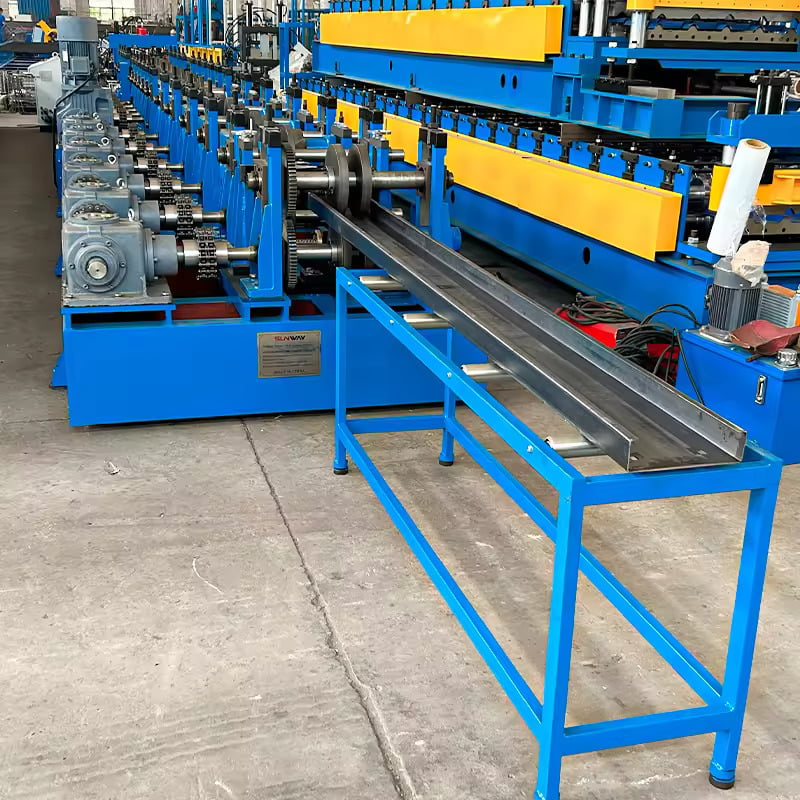
Corrugated Iron Sheets in Composite Metal Decking
Corrugated iron sheets form the basis of composite metal decking systems. These sheets, typically ribbed or grooved, create a mechanical bond with concrete, enhancing overall strength. Different patterns and metal powders influence the sheet’s performance.
Popular Models of Metal Powders in Composite Decking
Here are some common powders used in composite decking and their characteristics:
| Metal Powder Model | Description |
|---|---|
| Zinc-Aluminum Alloy | High corrosion resistance, suitable for outdoor or marine environments. |
| Chromium-Molybdenum Steel | Enhances tensile strength and reduces brittleness. |
| Galvalume | Known for longevity, great for roofing and extreme weather. |
| Aluminum Oxide | Lightweight, high thermal resistance, used in high-temp environments. |
| Copper-Nickel Alloy | Corrosion-resistant, often used in chemical facilities. |
| Magnesium Alloys | Lightweight, used where weight reduction is critical. |
| Silicon Bronze | Combines strength with a classic look, often used in architectural applications. |
| Stainless Steel Powder | Superior rust resistance, good for indoor and coastal projects. |
| Titanium Alloy | High strength-to-weight ratio, though costly, used in premium applications. |
| Nickel-Chromium Alloy | Provides resistance to high temperatures and oxidation. |
Types of Composite Metal Decking
Various composite metal decking types are available, each suited to different needs and environments. Here’s a breakdown:
| Decking Type | Characteristics | Ideal Use Case |
|---|---|---|
| Shallow Decking | Lightweight, quick installation | Low-rise buildings |
| Deep Decking | Stronger, supports greater spans | High-rise and industrial buildings |
| Corrugated Decking | Adds rigidity and bonding with concrete | Mid- to high-rise buildings |
| Open-Rib Decking | Easier concrete bonding, enhances strength | Structures requiring high load capacity |
| Steel Composite Decking | Resistant to fire, supports heavy loads | Warehouses, commercial buildings |
| Rebar-Reinforced Decking | Enhanced support through embedded rebar | Heavily loaded floors |
| Cellular Composite Decking | Conceals wiring and plumbing | Office buildings, schools |
How Composite Metal Decking Works
Composite decking works by uniting metal sheets and concrete, which interact under load to form a structurally superior unit. The metal sheets support the concrete, reducing the need for excessive formwork, while the concrete bonds with the metal’s surface, creating a load-bearing floor or roof.
Key Components and Their Functions
| Component | Function |
|---|---|
| Metal Decking Sheets | Base support structure, enhances concrete bond. |
| Concrete | Provides compressive strength. |
| Rebar (optional) | Adds tensile strength, controls cracks. |
| Shear Studs | Transfers force between concrete and steel. |
| Fasteners | Secures metal sheets, maintains alignment. |
-
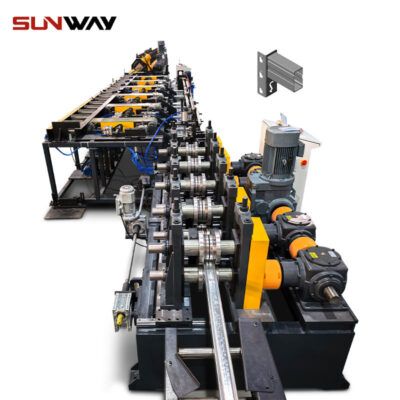 Storage Rack Shelf Box Panel Making Machine Steel Storage Rack System Box Beam Roll Forming Line
Storage Rack Shelf Box Panel Making Machine Steel Storage Rack System Box Beam Roll Forming Line -
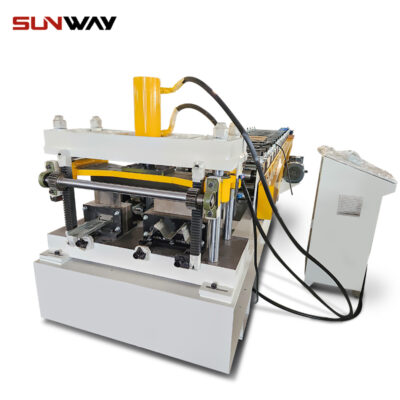 Multi Profiles Roll Forming Machine
Multi Profiles Roll Forming Machine -
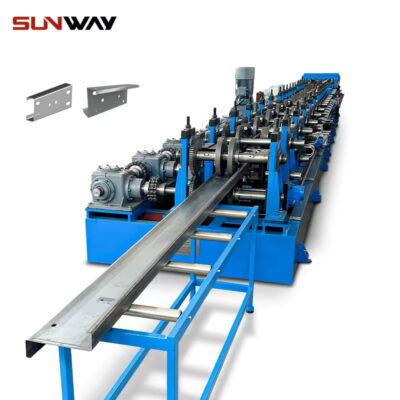 Auto Changeable C Z Purline Machine
Auto Changeable C Z Purline Machine -
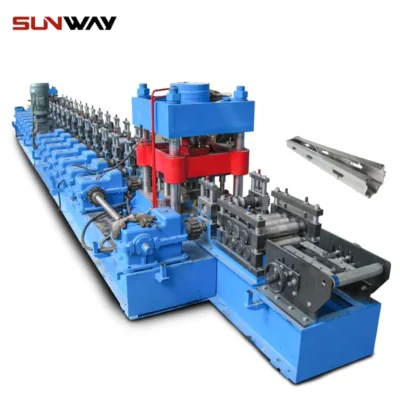 Vineyard Post Roll Forming Machine
Vineyard Post Roll Forming Machine -
 Scaffolding Plank Roll Forming Machine
Scaffolding Plank Roll Forming Machine -
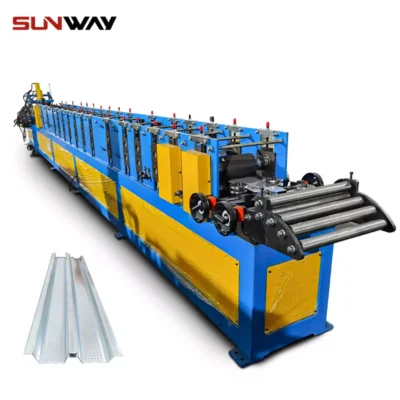 Light Gauge Steel Roll Forming Machine
Light Gauge Steel Roll Forming Machine -
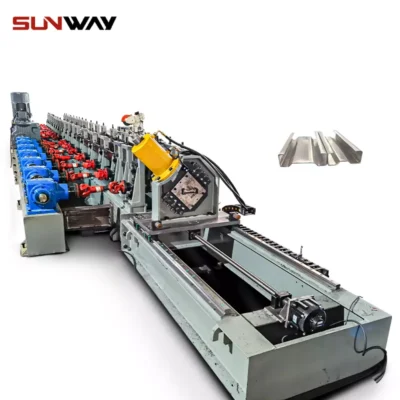 Auto Size Changeable Sigma Purlin Roll Forming Machine
Auto Size Changeable Sigma Purlin Roll Forming Machine -
 Auto Size Changeable C Z Purlin Roll Forming Machine
Auto Size Changeable C Z Purlin Roll Forming Machine -
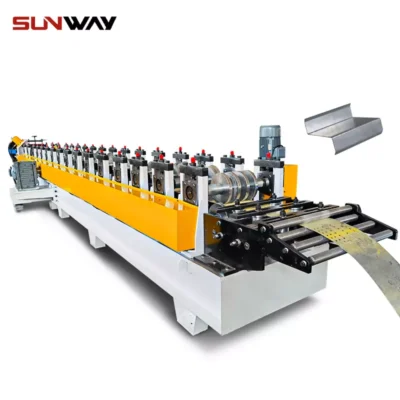 Auto Size Changeable Z Purlin Roll Forming Machine
Auto Size Changeable Z Purlin Roll Forming Machine
Machine Speed and Efficiency in Metal Decking Production
Metal decking production involves precise machinery designed to maintain high speeds without compromising on quality.
| Machine Type | Typical Speed (m/min) | Efficiency (%) |
|---|---|---|
| Roll Forming Machine | 20-30 | 90-95 |
| Decking Shear Machine | 15-25 | 85-90 |
| Cut-to-Length Machine | 10-15 | 80-85 |
Customizable Mechanical Parameters in Metal Decking
Decking systems offer flexibility through adjustable mechanical properties tailored to the project.
| Parameter | Typical Range | Description |
|---|---|---|
| Thickness | 0.8 – 2.0 mm | Thickness affects strength and weight |
| Width | 600 – 1500 mm | Determines coverage and layout |
| Yield Strength | 250 – 550 MPa | Material’s load-carrying capacity |
| Span Capacity | 1.5 – 4.5 meters | Supports larger spans for open spaces |
Applications and Uses of Composite Metal Decking
Composite decking’s durability and strength make it suitable for various applications:
| Application | Benefit |
|---|---|
| Office Buildings | Reduces structural load |
| Residential Buildings | Quick installation, fire resistance |
| Parking Structures | High load-bearing capacity |
| Schools and Hospitals | Long-lasting, low maintenance |
| Shopping Malls | Supports large open spaces |
| Industrial Warehouses | Resistant to heavy loading |
Installation, Operation, and Maintenance Tips
| Phase | Best Practices |
|---|---|
| Installation | Ensure precise alignment of sheets, follow manufacturer guidelines. |
| Operation | Regularly check for alignment issues, maintain structural load limits. |
| Maintenance | Inspect for corrosion, clean periodically, and repair any visible cracks in concrete or metal. |
Supplier Comparison and Price Range for Composite Metal Decking
Choosing a reliable supplier can make a big difference in quality and cost.
| Supplier | Price Range (per sq ft) | Notes |
|---|---|---|
| DeckingPro | $3.50 – $5.00 | Known for quality materials |
| BuildWell Metals | $3.00 – $4.50 | Budget-friendly options |
| SteelTech Corp | $4.00 – $5.50 | Offers customizations |
| ConcreteSteel Inc. | $3.25 – $4.75 | Durable, good for commercial |
Advantages and Limitations of Composite Metal Decking
| Feature | Pros | Cons |
|---|---|---|
| Strength | Supports heavy loads | Can be overkill for low-load areas |
| Durability | Long lifespan | Requires periodic maintenance |
| Cost Efficiency | Saves time and labor | Initial cost can be high |
| Flexibility | Multiple design options | Some materials are heavy |
| Fire Resistance | Reduces fire risk in buildings | Depends on material type |
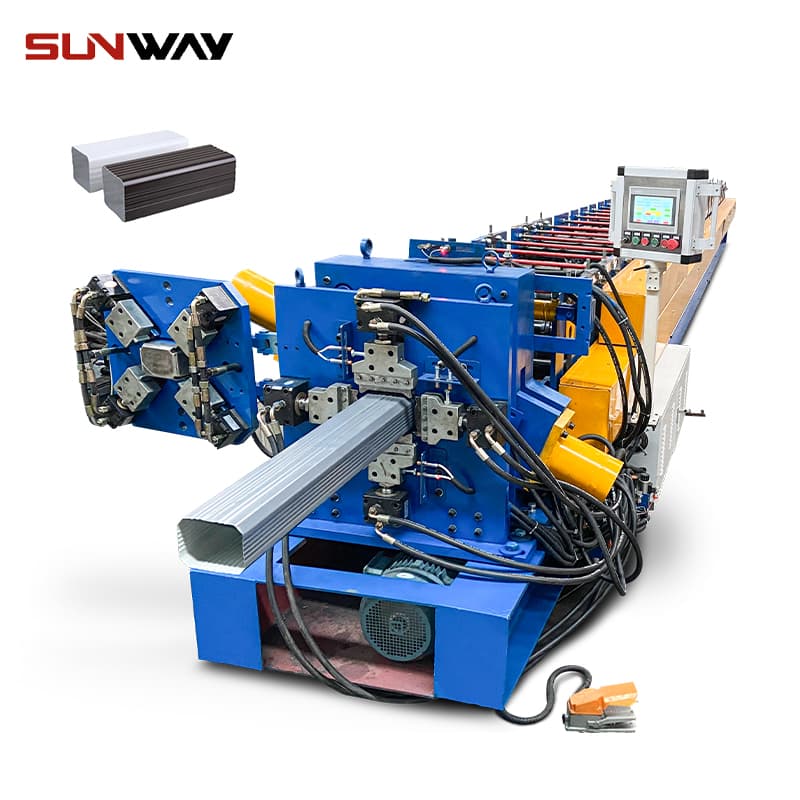
How to Choose the Right Supplier
| Consideration | Description |
|---|---|
| Material Quality | Ensure the metal has a high yield strength and corrosion resistance. |
| Customizability | Some suppliers offer unique sizes and shapes. |
| Reputation and Reviews | Look for suppliers with positive customer feedback. |
| Warranty | Quality suppliers often offer product warranties. |
FAQs
| Question | Answer |
|---|---|
| What is composite metal decking? | It’s a flooring system that combines metal sheets and concrete for strong, durable floors. |
| Is composite decking waterproof? | While it resists moisture, it’s best suited for sheltered or indoor environments. |
| How long does composite decking last? | With proper maintenance, it can last several decades. |
| Is composite metal decking eco-friendly? | It often uses recyclable materials, making it eco-friendly. |
| What’s the best application for composite decking? | It’s ideal for multi-story buildings and industrial structures. |
